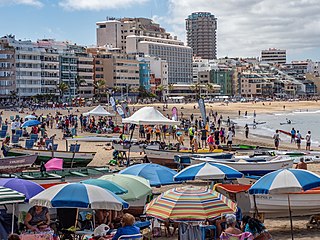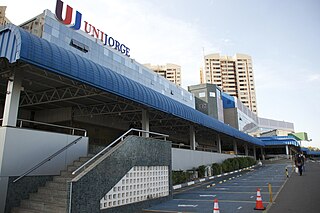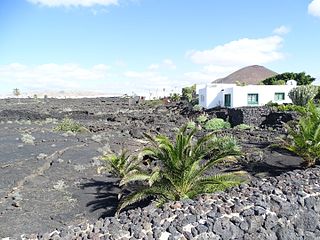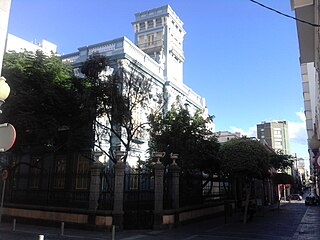
The Canary Islands, also known informally as the Canaries, are a Spanish autonomous community and archipelago in Macaronesia in the Atlantic Ocean. At their closest point to the African mainland, they are 100 kilometres west of Morocco and the Western Sahara. The Canary Islands are part of Spanish Africa. They are the southernmost of the autonomous communities of Spain. The islands have a population of 2.2 million people and are the most populous special territory of the European Union.

Las Palmas, officially Las Palmas de Gran Canaria, is a Spanish city and capital of Gran Canaria, in the Canary Islands, in the Atlantic Ocean.

Gran Canaria, also Grand Canary Island, is the third-largest and second-most-populous island of the Canary Islands, an archipelago off the Atlantic coast of Northwest Africa and is part of Spain. As of 2023 the island had a population of 862,893 that constitutes approximately 40% of the population of the archipelago. Las Palmas de Gran Canaria, the capital of the island, is the biggest city of the Canary Islands and the ninth of Spain.

San Bartolomé de Tirajana is a village and a Spanish municipality in the south-eastern part of the island of Gran Canaria in the Las Palmas province in the Canary Islands. With an area of 333.13 km2 (128.62 sq mi), San Bartolomé de Tirajana is the largest municipality in area on the island as well as the Canary Islands. The population is 56,698 (2013).

The University of La Laguna is a public research university situated in San Cristóbal de La Laguna, on the island of Tenerife, Spain. It is the oldest university in the Canary Islands. The university has six campuses: Central, Anchieta, Guajara, Campus del Sur, Ofra and Santa Cruz de Tenerife.

Universidad de Las Palmas de Gran Canaria Club de Fútbol was a Spanish football team based in Las Palmas de Gran Canaria, in the Canary Islands. Founded in 1994 as Vegueta-Universidad, it was dissolved in 2011 due to insurmountable economic problems.

Juan Bordes. also known as Juan Bordes Caballero, is a Spanish sculptor. specializing in the portrayal of the human figure. He is the author of several books, the organizer of convention programs, and the subject of exhibitions.

The Centro Universitário Jorge Amado is a private institution founded in 1999 and located in the city of Salvador, Bahia, Brazil. It has more than 30 undergraduate courses and some post-graduate courses.

Tahíche is a village located in the municipality of Teguise on the island of Lanzarote. According to the 2009 census (INE), it had a population of 3,865, in 2011 a population of 4,101.
The British School of Gran Canaria is a British international school on Gran Canaria in Spain. It consists of two campuses: the Tafira School in Las Palmas and the South School in San Bartolomé de Tirajana. It serves levels infants through sixth form college.

Martín Chirino López was a Spanish sculptor. Cofounder of the group El Paso in 1957, Chirino worked mainly with iron and his work is categorized as abstract art.
The following is a timeline of the history of the city of Las Palmas, Canary Islands, Spain.

José Antonio Sosa Diaz-Saavedra is a Spanish architect, university professor and researcher. He is a member of the Royal Canarian Academy of Fine Arts of St. Michael Archángel.

Noemí Santana Perera is a member of the Podemos party and its spokesperson in the Parliament of the Canary Islands.
As in the rest of Spain, the majority religion in the Canary Islands is the Catholic Church. The Catholic religion has been the majority since the Conquest of the Canary Islands in the fifteenth century. This religion would largely replace the Canarian aboriginal religion through the prohibition of the latter and syncretism. According to a survey conducted in 2019, Canary Islands is the fifth autonomous community in Spain with the highest percentage of people who declare themselves to be Catholics after the Region of Murcia, Extremadura, Galicia, Aragon, and Castile and León. 76.7% of the population is Catholic.

The Elder Museum of Science and Technology is a museum in Las Palmas, the capital city of Gran Canaria in the Canary Islands.

Rebeca Nuez Suarez, is a Spanish classical violinist.

The Palacete Rodríguez Quegles is a mansion, or small palace, in Las Palmas, capital of Gran Canaria island, in the Canary Islands of Spain. It was built around 1901 as an elaborate residence for a wealthy businessman, then in 1972 sold to the city of Las Palmas for use as a music conservatory. The restored building is now a cultural center.
Hernán Peraza Martel also known as Hernán/Fernán Peraza the Elder , was a Castilian nobleman and Conquistador, and the territorial lord of the Canary Islands in the fifteenth century.

The GC-3, known officially as Circunvalación de Las Palmas de Gran Canaria is a superhighway in Gran Canaria. It connects the two trunk roads GC-1 and GC-2 over a length of 13 km (8.1 mi). A good half of the north-south traffic on the island is now handled by the GC-3, which significantly relieves the Avenida Marítima and the Túnel del Ingeniero Julio Luengo.


















